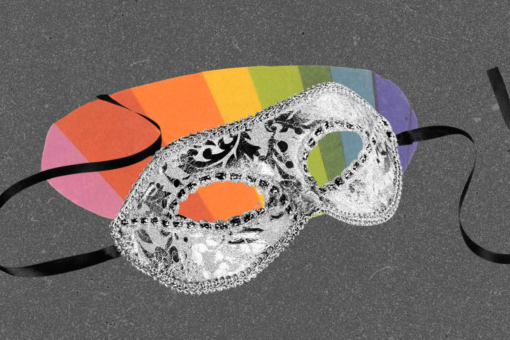Rebbetzin means “the rabbi’s wife” in Yiddish. Traditionally, the rebbetzin is imagined as supplying the coziness factor of Jewish life: the homemade challah at kiddush, a home-cooked meal, potentially running the Hebrew school and even advising women in the Jewish practices of family purity. However, with the advent of feminism and dual-career households, these unpaid duties can be somewhat problematic.
In my family, there’s an additional twist: As a same-sex couple, my wife and I are constantly inadvertently (and advertently) sneezing all over expected gender roles in Judaism.
As my wife transitioned from assistant rabbi in the suburbs of New York City to head rabbi of a tight-knit congregation in Wilmington, North Carolina, I was suddenly launched into an identity I never expected: Southern lesbian rebbetzin. As a born and bred “Yankee,” I grew up with a lot of stereotypes around Southern culture, including extreme racism, traditional values and a lack of acceptance for the LGBTQ community. Moving to the South, I’ve quickly learned that there is a great deal of nuance that Northerners miss, both about the South in general and about Southern Jews.
As my family settled in to our new community, I wondered if there were other LGBTQ “rebbetzin” in the region, and how Southern culture and Jewry might have impacted their experience in an already complex role. When I spoke with other LGBTQ clergy spouses (male and female) to compare notes on our congregations’ confusion about exactly how we fit in, I found that I was not alone — and some of our predecessors had been around for decades. While participants only agreed to speak on the condition of anonymity, a common thread throughout was deep gratitude for their acceptance and integration into their respective communities.
Many of the clergy spouses I interviewed belong to synagogues serving 150 family units or less. For them, a huge part of the Southern experience is lack of accessibility, from kosher products to visibility. There’s a significant lack of understanding of the Jewish community by outsiders.
At the same time, there’s a special camaraderie in Southern Jewish communities. There’s a sense that people have each other’s backs in the larger community and enjoy spending time with each other outside of synagogue functions — a kind of Southern Jewish hospitality. After their spouse was hired, the clergy spouses felt that this social capital extended to them as well, regardless of sexuality.
Just hiring LGBTQ clergy can become a symbol of radical acceptance. One of my colleagues wrote, “I felt very proud of this small Southern Conservative synagogue for choosing a gay rabbi and a woman! This seemed to be a huge step for them.” Another knew that she had found her community during the interview week, when she was invited to a meet-and-greet with other LGBTQ congregants: “I felt the joy in the room. These congregants who originally had to fight for their place in the community would now see their identities reflected in their religious leader.” It was the first time she had ever attended a synagogue with openly LGBTQ members, even though she grew up above the Mason-Dixon line.
Despite this openness, many clergy spouses did encounter tacit expectations of participation in the community. Taking part in events and services is a huge time commitment, and lack of participation by the spouse still reflects badly on the clergy. For some, these expectations aligned with a love of Jewish practice if there were clear boundaries in place: “When the rabbi first started her position, many people assumed I would be in the kitchen cooking. I made it known rather quickly that I am not a cook or a kitchen person. Everyone seemed fine with that, and perhaps it set the tone that I am able to set clear limits with what I am willing and not willing to do.”
For another clergy spouse, famous Southern hospitality helped them to fulfill the community’s expectations: “Because I am introverted and have social anxiety, the type of participation expected from ‘the rebbetzin’ doesn’t come naturally to me. I don’t always enjoy it and it feels more like work. However, the warmth I’ve experienced in my community has helped me be more comfortable in the role.”
These “rebbetzin” expectations can be complicated by prejudice, even if it’s unconscious. Some of the clergy spouses interviewed claimed that they had not yet encountered any difficulties with their community because of their LGBTQ identity. Others shared that they have experienced microaggressions — especially stinging comments that were most likely unintentional.
One interviewee recalled a community dinner party where they were introduced by a board member to a congregant who was reluctant to accept a gay rabbi in their synagogue. The idea was to get to know this individual informally and somehow win them over. After a short conversation which spanned general introductions and a shared taste in music, the congregant commented, “Now that I see you’re normal, I’m ok with you.”
“On the one hand, this moment could have been perceived as a step forward, creating a new ally,” this interviewee reflected. “But I find these types of comments very painful on a certain level, because it feels like up until that moment they could not just see us as people.”
While none of the contemporary rebbetzin that I interviewed served as advisors on family purity, most took advantage of their leadership position in the community to advocate for LGBTQ inclusion. “I educate when I can, advocate when I can, and be a good role model for living an out and proud authentic life,” one interviewee explained. Whether using queer Jewish source texts for classes or casually talking about their experiences, LGBTQ clergy spouses play a crucial role in building the type of Judaism they practice — a Judaism which combines the tightknit warmth of Southern hospitality with inclusion for all.



